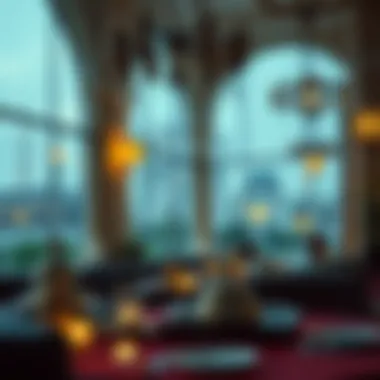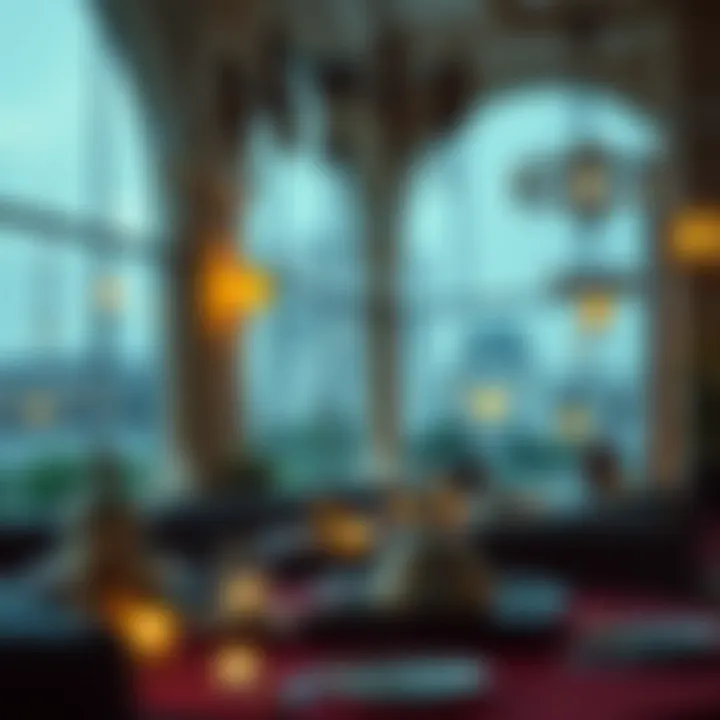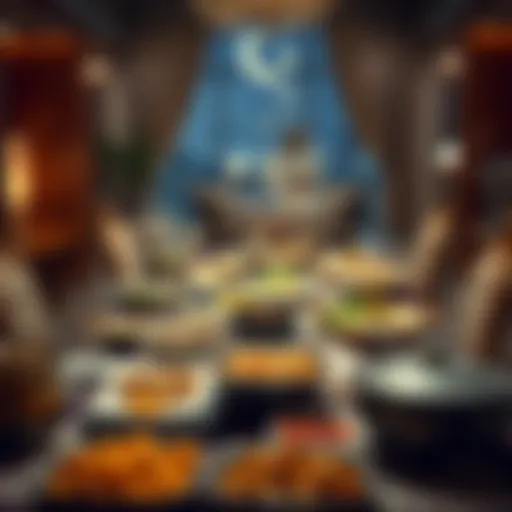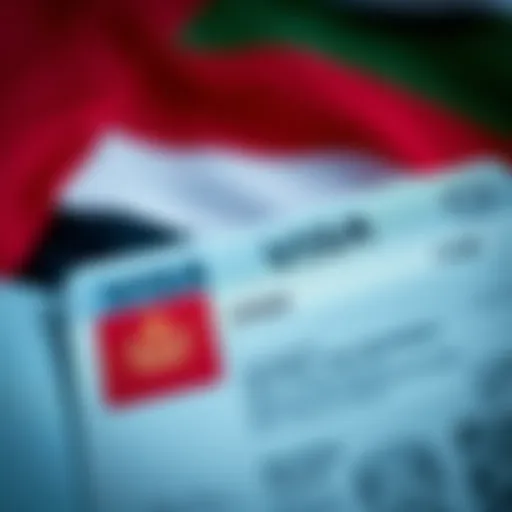Iftar Time Today: All You Need to Know


Intro
Iftar, the meal that breaks the fast during Ramadan, holds a significant place in the hearts of Muslims worldwide. It transcends mere sustenance; it is a time for connection—both with family and the broader community. This meal, observed after sunset, embodies the spirit of compassion and charity.
The experience varies widely across cultures, and here we turn a keen eye on how these rituals manifest in Dubai, a melting pot of backgrounds and traditions. From lavish buffets to serene family dinners, the nuances of iftar are proudly showcased across the city. In this guide, we will explore the various aspects of today's iftar—its timing, local customs, and communal practices—specific to Dubai's diverse population.
As we navigate this exploration, we'll delve into how contemporary life interacts with age-old traditions. From the essential importance of exact timings, which can vary even by a few minutes depending on geographical location, to how individuals and families incorporate these customs into their daily lives, we will unpack the broader implications of iftar today. In doing so, we aim to provide deeper insights to enhance your appreciation of this celebrated meal.
Understanding Iftar
Iftar is more than just a meal; it is a rite of passage that plays a pivotal role in the observance of Ramadan. Understanding Iftar enhances one’s appreciation for the spiritual, social, and cultural tree that nourishes Muslim communities worldwide. It represents the breaking of fast at sunset, a moment that fosters a sense of togetherness and devotion.
Definition of Iftar
At its core, Iftar refers to the evening meal that Muslims partake in after a day of fasting from dawn to sunset. This break in the fast typically starts with the consumption of dates and water, following the tradition established by the Prophet Muhammad. The term itself derives from the Arabic word "iftār," which translates to "breaking fast." This word encapsulates the essence of the occasion, as participants not only restore physical energy but also re-establish communal bonds.
Historical Context
The history of Iftar is intertwined with the inception of Ramadan itself, dating back to the time of the Prophet Muhammad in the 7th century. Ramadan was initiated as a month of fasting outlined in the Qur’an, marking a period of reflection and worship. Over the centuries, customs and practices surrounding Iftar have evolved, influenced by local traditions. In many cultures, Iftar is not simply a solitary act; it transforms into grand communal feasts, where families and friends gather. In places like Egypt, for instance, it is common for locals to partake in large outdoor gatherings, often highlighting the cultural tapestry that is woven with various regional cuisines.
Spiritual Significance
Iftar holds profound spiritual significance beyond the act of eating. It signifies the culmination of a day spent in reflection, prayer, and self-discipline. The transition from fasting to feasting aligns with the values of gratitude and humility intrinsic to Islamic teachings. During this time, Muslims often engage in prayers, reflections, and expressions of thanks. This not only strengthens their faith but also fosters an appreciation of the bounties that life offers. It serves as a reminder of the less fortunate, emphasizing charity and sharing, which are critical facets of Islamic tradition.
"Iftar is a moment of gratitude, a celebration of faith, and above all, a communal experience that binds the fabric of society."
Understanding Iftar goes far beyond its definition; it encapsulates a lifetime of traditions, teachings, and memories that resonate within Muslim households worldwide. In the diversity of its practices, from the types of foods consumed to the gatherings formed, Iftar emerges as a universal symbol of faith and camaraderie.
The Ritual of Breaking Fast
The act of breaking fast during Ramadan is more than just a simple meal; it's an intricate ritual steeped in tradition, reflecting both personal and communal significance. This moment marks the end of a day's fasting and serves as a communal celebration, bringing families and communities together in shared spirituality and gratitude. The essence of iftar lies not only in nourishment but also in the reaffirmation of faith and social bonds. This segment will explore the traditional practices surrounding this ritual as well as the modern twists that have emerged over time.
Traditional Practices
In many cultures, iftar is a time-honored set of customs, with each region adding its own flavors and traditions. Typically, the fast is broken immediately after sunset, often symbolized by the call to prayer, known as Adhan. Many start with dates and water, reflecting a practice rooted in the traditions of the Prophet Muhammad.
- Dates and Water: Breaking the fast with dates is not just a matter of preference; it has deep historical roots. Dates provide an instant source of energy and replenishment for the body after hours of abstaining from food and drink.
- Prayer: Prior to eating, many observe a moment of prayer, giving thanks for the sustenance and the opportunity to gather with loved ones.
- Community Feasts: In numerous cultures, communal iftar meals are a central aspect. Neighbors may come together in homes, community centers, or mosques, often resulting in lavish spreads that feature regional dishes, creating a sense of unity and friendship.
In regions where hospitality is paramount, it is customary to invite others to join even without prior arrangements. This open-door policy enhances bonds, ensuring no one is left out during this special time.
Modern Adaptations
As society evolves, so too do the practices surrounding iftar. While traditional elements remain, contemporary influences have led to exciting adaptations that reflect modern lifestyles and culinary diversity.


- Diverse Menus: Customarily, the iftar meal consisted of local staples, but today’s offerings can range widely. From gourmet iftar buffets in upscale restaurants to food trucks catering to varied palates, the options are endless. Fusion cuisines, which blend different culinary traditions, bring new flavors that appeal to a broader audience.
- Health Conscious Choices: With increasing awareness around health and nutrition, many people now focus on creating balanced meals filled with fruits, vegetables, and lean proteins rather than just indulging in fried or sugary foods. Recipes for healthier soups, salads, and whole-grain options are gaining popularity.
- Technology in Planning: In today’s fast-paced world, technology has redefined how people plan their iftar. Various apps enable families to share their iftar schedules, organize communal meals, or even engage in virtual gatherings, especially relevant amidst global pandemic challenges.
The transformation of iftar practices captures the blending of tradition and modernity, illustrating how communities remain resilient while adapting to contemporary lifestyles and tastes. This evolving nature of iftar reflects the vibrancy of cultures as they connect spirituality with daily life in unique and meaningful ways.
"Tradition is not the worship of ashes, but the preservation of fire." - Gustav Mahler
Today’s Iftar Time
Understanding today’s iftar time holds great importance, especially during the holy month of Ramadan. It isn't just the end of a long day of fasting; it's a significant moment that symbolizes community, spirituality, and continuity. Knowing the exact timing to break the fast aids in the observance of religious duties, fostering a deep connection to the practices that shape this sacred month.
The calculation of iftar time is influenced by various factors, including geographic location and varying sunset times. Local customs can also blend into the rituals, making the observance unique to each region. The significance of precision in timing cannot be understated, as it aligns both religious practice and personal devotion in a tangible way.
Calculation Methodologies
Calculating today's iftar time typically relies on the time of sunset, which can vary not only day by day but also from place to place. Furthermore, it is calculated based on certain methodologies, including:
- Astronomical Calculations: These are derived from precise geographic coordinates, which include latitude and longitude. Programs and almanacs use these calculations to determine the precise moment of sunset.
- Local Mosques: Most communities will rely on their local mosques to provide exact prayer times, often reflecting a consensus for the area, ensuring that everyone adheres to the same timing.
- Mobile Applications and Websites: Digital resources, such as IslamicFinder or Muslim Pro, allow individuals to check their specific iftar time based on their location. These apps use GPS technology to calculate accurate timings amidst changing sunset schedules.
Hence, through a blend of tradition and technology, individuals are empowered to break their fast precisely, preserving the integrity of the spiritual experience.
Variations Based on Location
The experience of iftar drastically varies according to one’s location. In some regions, iftar might be a solitary affair, while in others, it's a large communal gathering. Notably, several elements contribute to these variations:
- Cultural Influences: Each region has its own customs woven into the fabric of iftar, influencing the types of foods presented. For instance, in Indonesia, fried snacks like gorengan take the stage, while Middle Eastern cultures may lean towards dates and rich soups.
- Timing Adjustments: In higher latitudes, the sunset can be significantly delayed during certain months. In some northern places, Muslims may need to follow the closest Muslim-majority country’s timing if sunset occurs too late.
- Community Practices: In various cultures, communal iftars bring families and friends together, enhancing relationships and fostering a sense of belonging. Cities like Dubai often hold large public iftar events, emphasizing the collective aspect of breaking the fast.
All these dimensions highlight how important it is to be aware of local contexts when determining today’s iftar time, ensuring that this core component of Ramadan is honored with respect and tradition.
Cultural Variations of Iftar
Cultural variations of iftar are an intriguing aspect of Ramadan that bring depth and richness to this significant event. Every culture has its way of celebrating the end of fasting, and these differences not only highlight local customs but also enhance communal ties. Understanding these cultural nuances promotes a deeper appreciation for how iftar is perceived around the world and particularly within diverse settings like Dubai.
Regional Dishes
When you think about iftar, the food on your table speaks volumes. Different regions bring their unique flavors and dishes to this meal, showcasing culinary diversity. For instance, in the Middle East, dates and water typically kick off the meal, following a tradition that goes back centuries. Freshly made lentil soup is common, providing warmth and comfort after a long day of fasting.
In South Asia, you'll find various spicy dishes such as samosas, bhajis, and sweet gulab jamun gracing the table, offering a delightful mix of flavors. In contrast, North African iftars might feature harira, a nourishing soup made of tomatoes and lentils, often enjoyed with fresh bread.
Although the main dishes may vary, the concept of sharing these meals with family and friends remains constant. In effect, regional dishes reflect a society's agricultural bounty and cooking techniques, yet they unite people under the same spirit of hospitality and gratitude as they break their fast together.
Communal Gatherings
Iftar is more than just a meal; it’s a communal experience, a gathering where people come together to reflect and rejoice. This social aspect takes many forms, from family dinners to larger public events. In Dubai, for instance, you can find community iftars hosted in parks and mosques, where hundreds gather around long tables laden with traditional dishes.
The act of breaking bread with others symbolizes unity and togetherness. During these gatherings, traditional prayers are often recited, and stories are shared. The sense of community fosters connections not just with family but also among neighbors and strangers, reinforcing social bonds.


Moreover, these collective celebrations often include reaching out to the less fortunate. Many communities organize iftar events to feed the hungry, promoting a spirit of giving and empathy.
"In sharing meals, we share lives—a simple act that bridges gaps and strengthens ties among us."
Ultimately, cultural variations in iftar offer a window into understanding societal values and relationships. Celebrating these differences enhances our connection to the broader community while reminding us of the universality of the human experience during this blessed month.
Health Considerations
Understanding health considerations during Iftar is crucial for those observing Ramadan. It’s essential to appreciate how the body reacts after a long day of fasting. Iftar is not just about breaking the fast; it’s an opportunity to nourish the body after hours without food and water. This section explores the need for balance and hydration, emphasizing the importance of both as we break our fast with intention and care.
Nutritional Balance
Achieving nutritional balance during Iftar is key to maintaining health and well-being. After a day of fasting, the body seeks various nutrients to recuperate. Ideally, a well-rounded Iftar includes a mix of complex carbohydrates, proteins, healthy fats, and, of course, an assortment of fruits and vegetables.
- Complex Carbohydrates: These provide a steady release of energy. Options include brown rice, whole grain bread, or lentils.
- Proteins: Lean meats like chicken and fish, beans, or nuts are excellent sources. They help repair the body’s tissues, crucial after fasting.
- Healthy Fats: Avocado or olive oil not only add flavor but also essential fatty acids.
- Fruits and Vegetables: Vital for vitamins and minerals, incorporating tomatoes, cucumbers, and citrus fruits can aid digestion and boost immune function.
When selecting foods, it’s wise to avoid overly fried or greasy dishes, as these can overwhelm the digestive system after an extended period of fasting. Instead, aim for freshness and wholesomeness, considering the body’s sensitive state.
Hydration Importance
When it comes to hydration, it can’t be emphasized enough how important it is during and after Iftar. Practically, people can go more than 12 hours without water; replenishing lost fluids should be a priority.
Start Iftar by breaking the fast with water or something hydrating, like coconut water or fresh fruit juices. This not only quenches the thirst but also rehydrates the body effectively. Here are some aspects to consider:
- Gradual Intake: Drink water gradually rather than gulping it down all at once. This helps the body absorb fluids better.
- Avoid Sugary Drinks: Although they might seem tempting, sugary sodas and energy drinks can dehydrate rather than hydrate.
- Limit Caffeinated Beverages: Coffee and tea can have a diuretic effect, promoting fluid loss. It's best to enjoy them in moderation, perhaps at a later time in the evening.
Overall, keeping an eye on hydration, along with balanced nutrition, lays the groundwork for a healthier Ramadan experience. With careful attention to eating and drinking habits, individuals can maintain their energy and enjoy the spiritual journey of this month fully.
Iftar in Dubai
Iftar in Dubai holds a unique place in the cultural fabric of the city, undeniably tied to the practices of Ramadan and the diversity of its population. The distinct blend of tradition and modernity demonstrates how this meal goes beyond mere sustenance; it fosters community, promotes hospitality, and accentuates the richness of local customs. In a bustling metropolis like Dubai, where people from various backgrounds converge, iftar becomes a confluence of flavors, shared experiences, and cherished moments.
Local Dining Options
When it comes to local dining options for iftar in Dubai, visitors and residents alike can find an extensive array of choices that cater to varied tastes and budgets. Dubai offers everything from lavish buffets in luxury hotels to traditional eateries serving authentic Arab cuisine. Here are a few popular spots:
- Al Mallah: A local favorite, known for its shawarma and other traditional dishes, this casual dining spot captures the essence of Arabic flavors.
- Ramadan Tent Experiences: During Ramadan, many hotels and restaurants set up lavish tents with exquisite décor, offering extended buffets featuring a mix of international and regional dishes.
- Zaroob: A casual eatery that combines tradition with a modern twist, Zaroob is known for its delectable street food style offerings available during iftar.
- Eauzone: Situated by the beach, it provides a stunning setting to enjoy an iftar while soaking in the view. It features a variety of Asian-infused dishes that appeal to diverse palates.
In addition to these, many local mosques also provide meals for the community, highlighting the spirit of sharing and generosity that defines iftar.
Community Events
Community events during iftar in Dubai significantly enhance the experience by fostering a collective spirit and sense of togetherness. These gatherings bring people from all walks of life to break their fast together, often promoting inclusivity and understanding across cultures. Events might include:


- Open Iftar Festivities: Various organizations host open iftar events where everyone is invited, irrespective of background, to join in breaking fast, share meals, and connect with one another.
- Charity Drives: Many events focus on giving back, where participants are encouraged to donate food or funds to support those in need. This practice reinforces the core value of charity associated with Ramadan.
- Cultural Festivals: Some locations organize cultural showcases featuring traditional music, dance, and arts, encouraging individuals to engage in learning about diverse cultures all while enjoying a communal meal.
Breaking bread together during iftar has become a beautiful way for people in Dubai to create bonds and build peace within a mosaic of communities.
Preparation for Iftar
The preparation for iftar transcends mere meal-making; it is a ritual steeped in significance that melds together cultural heritage, community ties, and personal reflection. Understanding the importance of preparation for iftar can enhance the experience, making it not just a meal but a celebration that unites people. In a city like Dubai, where diverse cultures converge, the ways in which families and communities navigate this preparation can vary widely, illustrating the beauty of these differences.
Menu Planning
Creating a menu for iftar is pivotal. It’s not just about what is served; it’s about planning a meal that fuels the body after a day of fasting while also being an engaging affair that brings people together. A well-thought-out menu should aim for nutritional balance and cultural resonance.
Here are some points to consider when planning your iftar menu:
- Traditional Dishes: Include a few favorites that resonate culturally. In Dubai, for example, dishes like harees, ma'louba, or shawarma can be delightful additions.
- Variety and Balance: Ensure a mixture of proteins, carbohydrates, and vegetables. This keeps the meal appealing and satisfies different dietary needs. Grilled meats, lentil salads, and plenty of fresh fruits can make for a well-rounded meal.
- Sweets and Refreshments: Conclude with something sweet, like kunafa or dates stuffed with nuts, which are staple delights. Hydration matters too; consider including refreshing drinks like qatayef, a traditional sweet dumpling filled with nuts, paired with refreshing drinks like jallab which not only taste good but also keep everyone hydrated.
This planning stage allows families to think ahead, minimizing last-minute stress and fostering a sense of anticipation among all participants.
Shopping Tips
Shopping for iftar can be as much an event as the meal itself. Here are a few practical tips to ease the shopping experience, especially during the bustling month of Ramadan:
- Prep a Shopping List: Before heading to the market or supermarket, create a comprehensive purchasing list. This will help avoid impulse buying and keep the budget in check.
- Timing is Key: Try to shop early in the day when the stores are less crowded. The rush around meal times can be overwhelming, resulting in an unfavorable shopping experience.
- Local Markets: Explore local markets where fresh produce is abundant. Not only do you get fresher ingredients, but you also support the local economy.
- Collaborate: Consider splitting shopping duties with family or friends. This not only eases the burden but also creates an opportunity to share cooking responsibilities.
- Deals and Discounts: Look out for promotions or bundles specific to Ramadan. Many stores offer discounts on essential items that can add value to your shopping experience.
Preparing for iftar through thoughtful menu planning and strategic shopping helps cultivate a loving atmosphere. With just a little effort and consideration, the preparation can lead to more meaningful and memorable gatherings that strengthen bonds between family and friends. In a way, it’s not just about eating; it’s about sharing experiences that reinforce community ties and celebrate the spirit of Ramadan.
"Preparation is the key to success."
With iftar, it's not just about the food on the table but also the connections and narratives shared around it, fortifying relationships that last beyond the month of Ramadan.
For further insights on varied cultural traditions during Ramadan, visit Britannica for in-depth explorations.
The End
In sum, the experience of iftar transcends mere sustenance; it serves as a critical period for reflection, connection, and celebration within the bounds of the holy month of Ramadan. The distinct rituals associated with this breaking of the fast highlight the myriad ways communities embrace their heritage while adapting to contemporary lifestyles. Iftar is not just about eating when the sun sets, but it embodies a gathering of family and friends, a moment to appreciate the day that has passed and to nourish both body and spirit.
Reflections on Iftar
Reflecting on iftar evokes thoughts on not just food but on the communal spirit it fosters. When the adhan calls, signaling the end of the day's fast, the joyous camaraderie can be felt everywhere. Families might gather around tables decorated with dishes that tell their own stories—like fragrant biryani or sweet kunafa. Each meal can reflect the local flavor or the family's traditions, creating a tapestry of tastes that narrate one's heritage. In more urban settings, these gatherings may even extend to community centers or mosques, where people share meals with those less fortunate, emphasizing generosity and kindness.
However, amid the rich flavors and bright gatherings, it's vital to recognize the personal journeys each individual may encounter. For someone fasting alone or new to the practice, the experience can be reflective, fostering moments of contemplation and community spirit in varied ways. Perhaps the memories formed during these nightly meals—whether joyous or reflective—play a crucial role in shaping one's relationship with faith and community. Through sharing dishes and stories, the bonds created during iftar strengthen societal ties, ensuring that isolation feels distant.
The Role of Iftar in Society
Iftar plays a profound role within societal frameworks, acting as a bridge between traditions and modern lifestyles. For many, it extends beyond familial walls, creating opportunities for social cohesion. It often signifies a time where individuals from different backgrounds come together, fostering unity and understanding. In cities like Dubai, where the population is a remarkable mix of cultures, the communal aspect of iftar becomes even more pronounced. Events may pop up at open spaces or restaurants, inviting everyone to partake, irrespective of their backgrounds.
Moreover, local businesses often thrive during iftar season, showcasing culinary traditions and reinforcing community ties. Restaurants might devise special iftar menus, and food markets may be bustling with activity. Such dynamics encourage local economies and spark collaborations among diverse groups, promoting economic and cultural growth.
All said and done, the significance of iftar cannot be overstated. It is both a personal experience and a societal event that shapes communal identities and embodies the spirit of Ramadan. Embracing the practices surrounding iftar promotes shared values and respect-oriented relationships that enhance communities overall.
“Through Iftar, we not only satiate our hunger but also cultivate a sense of togetherness that nourishes the soul.”
For further insights on related topics, readers may explore resources such as Britannica, or even join discussions on platforms like Reddit where diverse perspectives enrich one’s understanding.















